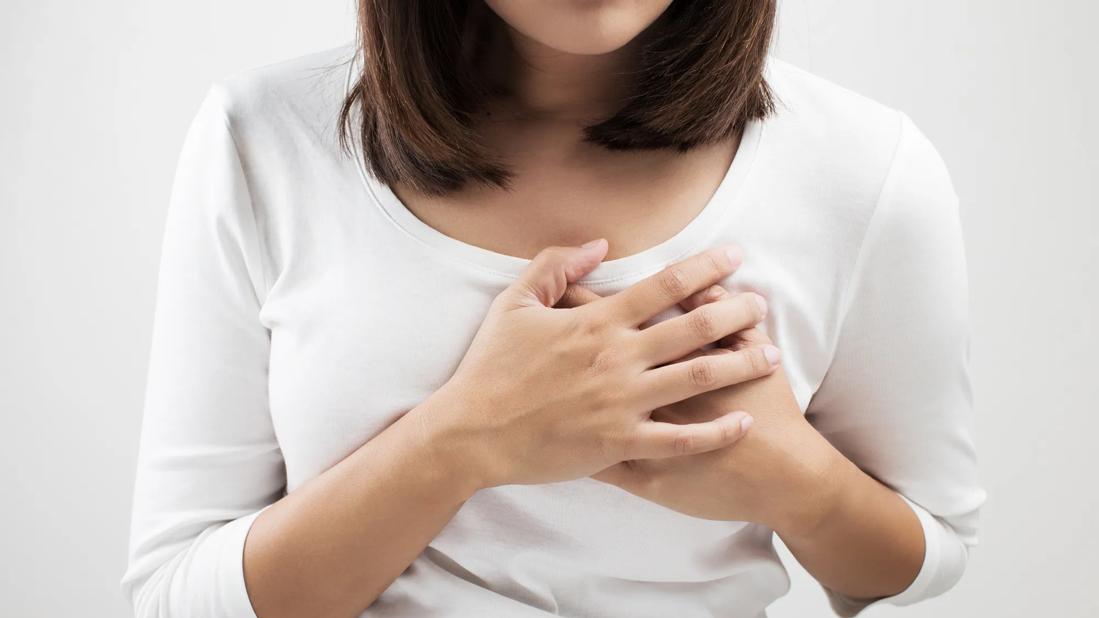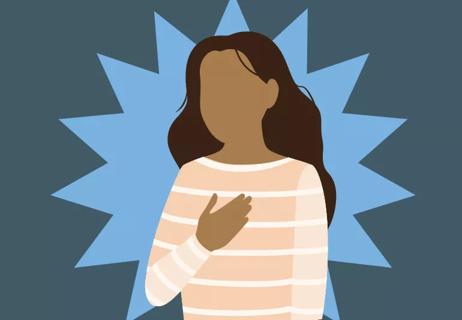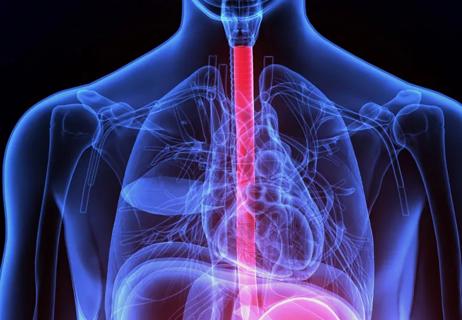From heartburn and panic attacks to muscle spasms and heart attacks, lots of medical conditions can cause chest pain

Chest pain is scary. And it can be serious. But there are lots of possible reasons you could experience a sudden stabbing pain in your chest. And many of them have nothing to do with your heart at all, says cardiologist Ajay Bhargava, MD.
Advertisement
Cleveland Clinic is a non-profit academic medical center. Advertising on our site helps support our mission. We do not endorse non-Cleveland Clinic products or services. Policy
Dr. Bhargava explains common causes of sudden chest pain — and when you should consider it an emergency.
Chest pain can be tough to explain. Especially if you’ve never felt it before. We’re focusing here on sudden chest pain: Pain that comes on without warning or explanation.
You may be feeling any — or many — of a wide range of painful sensations. Chest pain can be sharp or dull, throbbing or crushing, burning or tearing, tight or sore and much more.
Once you’ve characterized the type (or types) of pain you’re feeling, it’s time to think about intensity and duration. Ask yourself these questions:
If you’ve experienced chest pain before, you aren’t alone. In fact, chest pain accounts for 5% of all ER visits. And while the sensation is scary, the cause often isn’t.
According to a 2016 study that’s still cited today, less than 6% of people who go to the emergency room for chest pain actually have a life-threatening problem.
That doesn’t mean you should ignore the pain, of course. It could still signal something serious. Dr. Bhargava shares some of the many possible causes of sudden, sharp chest pain.
Advertisement
Chances are, when you hear “chest pain,” your brain goes straight to heart attacks. It’s an understandable reaction. We all know somebody whose chest pain turned out to be what doctors call a myocardial infarction.
Typical heart attack pain feels like heaviness, tightness or pressure. That pain sometimes extends into your arm, jaw, neck, stomach or back. These symptoms can last for minutes to hours.
Other common symptoms include:
Aortic dissection occurs when the layers of the aorta, your heart’s major blood vessel, tear apart. It often feels like a sharp, ripping pain in your chest and back.
This isn’t a sharp pain that eases after a minute. It’s a pain you can’t ignore. And you shouldn’t. An aortic dissection is an emergency.
Coronary artery disease causes a painful sensation in the chest called angina. But that pain’s usually described as heaviness, achiness, tightness or pressure — not a sharp, sudden blast.
“The pain is usually brought on by exertion and goes away with rest,” Dr. Bhargava says.
There are different types of heart inflammation. Each can cause chest pain.
Your chest can start hurting when your resting heart rate goes too high (tachycardia) OR too low (bradycardia). Most of us expect our heart to beat between 60 and 100 times a minute when we aren’t moving around.
When it comes to heart rate problems, what’s most important is what’s normal for you. If your heart’s beating too fast or too slow, you’ll probably have other symptoms in addition to chest pain, like shortness of breath, dizziness and excessive sweating. You need to get immediate medical attention.
Sharp chest pain could signal a pulmonary embolism (PE), a blood clot that lodges in the lungs. PEs interrupt the flow of blood and oxygen to your lung, which makes them a life-threatening emergency.
When you think of collapsed lungs (pneumothorax), you probably imagine dramatic injuries and dire illnesses. But sometimes it just … happens. It’s called a spontaneous pneumothorax.
Even if the condition is a medical mystery, it still needs urgent medical attention.
Conditions like bronchitis, pneumonia and pleurisy can be extremely sneaky sources of chest pain. Yes, most chest infections cause other symptoms, too. But your situation could be one of the exceptions that prove the rule.
Advertisement
Did you know spontaneous rib fractures are a thing? They are! It can happen to anyone, but it’s most likely if you have osteoporosis, an underlying bone condition, or if you do a lot of heavy lifting. Something as simple as coughing could be enough to cause a break!
The chest pain from a broken rib is sudden and sharp. It may hurt to breathe or move.
Odd as it may sound, chest pain may be a sign that something’s amiss in one of your abdominal organs. Gallbladder disease, gastritis and pancreatitis can all cause chest pain. So can an ulcer. Even a bad case of gas can cause chest pain!
It’s probably not your first guess. But it should definitely be up there. Issues with your gastrointestinal tract are an extremely frequent source of ER admissions for chest pain. In fact, about 30% of people who go to the ER for chest pain turn out to have gastroesophageal reflux disease (GERD).
Also known as acid reflux, GERD usually causes an easy-to-recognize burning sensation in your throat or chest — classic heartburn. But sometimes, GERD causes sharp chest pain and pressure.
“The pain and pressure are sometimes due to spasming of the esophagus, or food pipe,” Dr. Bhargava explains. Esophagitis, an inflammation of the lining of the food pipe that connects the throat to the stomach, can do the same thing.
Advertisement
With these conditions, pain is more likely after eating or lying down. You might also have a hard time swallowing.
Your heart is protected by bones, muscles, joints and connective tissue. And if they’re strained or damaged, it can be extremely painful.
If you recently hauled a heavy box or worked out too hard at the gym, you might develop a case of costochondritis — inflammation of the cartilage around your sternum. Dr. Bhargava says a bad case can cause significant pain. So can an injury to one of the muscles between your ribs.
Anxiety and panic attacks can sometimes be so severe that they’re mistaken for heart attacks. There’s good reason for that: There’s a lot of overlap between the symptoms.
If you aren’t sure what’s causing your chest pain, Dr. Bhargava says it’s always best to consult with a healthcare provider for advice. Ditto if anxiety or panic attacks are a frequent problem.
We’ve discussed a lot of different conditions. But when it comes to causes of random stabbing chest pains, we’re still only scratching the surface.
“Unfortunately, it can be tough to pinpoint the cause of chest pain on your own,” Dr. Bhargava notes. “We need to run tests to understand where the pain is coming from. And you simply can’t do that at home.”
Advertisement
All chest pain should be followed up by a provider. But how do you know if yours is a medical emergency? It’s a judgment you need to make based on:
If you’re young, otherwise healthy, the pain eases up after a few minutes and it doesn’t come back, it’s probably not urgent, Dr. Bhargava says. Especially if you don’t have any other symptoms. But you should definitely follow up with your primary care doctor.
If the pain is severe or isn’t going away, that’s a different story. Ditto for experiencing other symptoms that could indicate a heart or lung problem. Call 911 or local emergency services if you’re experiencing chest pain and:
It’s important to keep your medical history in mind as you evaluate your symptoms. Play it safe and go to the hospital if you have risk factors for heart disease.
“Err on the side of caution and see a doctor right away,” Dr. Bhargava advises. “It’s always better to be safe and have it evaluated.”
The bottom line? When in doubt, have it checked out.

Sign up for our Health Essentials emails for expert guidance on nutrition, fitness, sleep, skin care and more.
Learn more about our editorial process.
Advertisement

If you have other cardiac symptoms, and antacids aren’t working, it’s time to call emergency services

Feelings of stress or anxiety can cause an increase in hormones and a tightening of the chest muscles, which can lead to chest pain

If your provider has ruled out a serious cause, you can treat chest pain at home with antacids, inhalers or anti-inflammatory medications

Don’t ignore chest pressure that lingers and can’t be explained

Not all chest discomfort is a symptom of a heart attack

Why the condition, also called jackhammer esophagus, is missed

Certain supplements, like licorice root and St. John’s wort, can raise your blood pressure or negatively interact with medication

No, but it momentarily slows down during this involuntary body function

Even small moments of time outdoors can help reduce stress, boost mood and restore a sense of calm

A correct prescription helps your eyes see clearly — but as natural changes occur, you may need stronger or different eyeglasses

Both are medical emergencies, but they are very distinct events with different causes